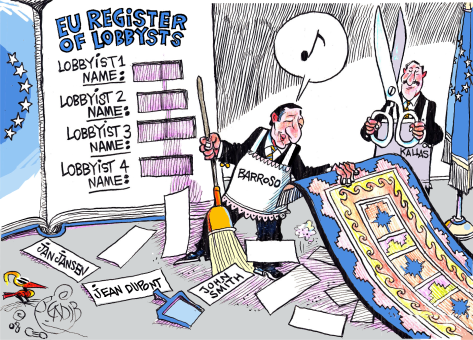How hired-gun lobbyists pulled the teeth out of new EU lobbyists' register
It has now become clear that the Commission's long-awaited lobbyists register (due to be launched on June 23rd) will be extremely unambitious.[1] Registration will be on a voluntary basis and the Commission will not ask organisations or firms to disclose the names of individual lobbyists. Moreover the financial transparency requirements for consultancy firms, who lobby on behalf of big business clients, have been seriously diluted. The Commission's approach is feeble, particularly when compared to the European Parliament's call for a mandatory register, including names of lobbyists and detailed financial transparency.[2]

Hi-res version of the cartoon (1.6 MB).
A preliminary analysis of documents obtained by Corporate Europe Observatory through freedom of information rules reveals that this watering down is a direct result of lobbying by EPACA, the European Public Affairs Consultancies Association, which represents that largest lobby consultancy firms in Brussels, (such as Hill & Knowlton and APCO). EPACA has been lobbying the Commission intensively since the publication of the follow-up Communication on the European Transparency Initiative in March 2007, to weaken requirements to disclose their lobbying on behalf of clients. Their efforts have paid off. Notes from a meeting between Commission officials and EPACA in late 2007 show that the Commission assured them that public affairs firms "will not be asked for any information leading to an absolute calculation of the amount one client represents".[3]
The Commission is now proposing that public affairs firms should just reveal their overall turnover from lobbying activities, stating how much they receive from each client in bands of 50,000 euro (clients paying 0-50,000 euro, 50,000-100,000 euro, etc.). The Commission has also offered the lobby consultancies the alternative option of stating what percentage of their overall lobbying income comes from a particular client - in bands of 10%. NGOs, in contrast, will be asked to disclose their total budgets and in the case of coalitions the total budgets of all member groups. The data emerging from the register, assuming that lobby groups register voluntarily, will be imprecise and incomparable. This gives EPACA exactly what it wanted, but it is a gross failure from a transparency point of view.
The notes of meetings with commercial lobbyists show that the Commission has gone a long way in accommodating the demands of these vested interests. Unless some last-minute improvements are made, the result will be a flawed register that falls short of the expectations raised by the Commission in the Green Paper and in other key documents on the European Transparency Initiative.
The Commission, through the Secretariat-General, which operates directly under Commission President Barroso, and which has been in charge of shaping the register, has rewarded EPACA for a cynical lobbying strategy that involved threats and calls for boycott.[4] In the terminology used by the lobbying industry, this aggressive approach is known as 'the gunship'. It is often, as in this case, combined with 'the dentist' technique, where lobbyists 'pull out the worst teeth' of policy proposals they dislike. In this case EPACA has managed to effectively pull the teeth out of the Commission's lobby transparency register.
The Commission seems to have been a little more firm in its response to lobbying from the Council of Bars and Law Societies of Europe (CCBE), which aimed to exclude lawyers from lobby transparency obligations. This may however also have been because EPACA lobbied against the CCBE position.
More generally, the Secretariat-General appears to have willing to offer far-reaching concessions to please vested interests provided they endorse the register. The decision to exclude names of lobbyists from the register is in response to a small number of requests from corporate groups in their submissions to the ETI stakeholder consultation. This not only ignores the fact that far more stakeholders considered names to be an obvious and crucial element of any lobby disclosure register; it also reflects a dramatic lack of ambition and political will.
While the Secretariat-General has probably never been very enthusiastic about Commissioner Kallas' drive to introduce lobby transparency rules, Mr. Kallas has also failed to stand firm against the lobbying from the lobbyists. While the official discourse says that low levels of registration may lead to a review of the system after one year and the possible introduction of a mandatory system, behind closed doors EPACA has been told that there is no reason to fear this will happen. Internal Commission notes from a meeting on 13 December 2007 describe how EPACA expressed concern that tougher requirements might be tabled later, using what is known as the 'salami technique'. In response to those concerns: "Vice-president Kallas tried to reassure his visitors by underlining that the Commission had no interest at toughening its approach".[5]
There is of course a bitter irony here, with lobbyists lobbying behind closed doors to protect their secrecy. But if the Commission's register is to retain any credibility, urgent action must be taken ahead of the launch on 23rd June to ensure that the information it contains provides a far greater degree of transparency.
For information about the campaign for strong transparency and accountability rules around EU lobbying, see the website of the Alliance for Transparency and Ethics Regulation (ALTER-EU): www.alter-eu.org
Notes
- The European Commission last week presented details of its plans for the new register in the Communication "European Transparency Initiative - A framework for relations with interest representatives (Register and Code of Conduct)" {SEC(2008) 1926}. See also: "Frequently Asked Questions (FAQ) on the Commission's register for interest representatives".
- For an assesment of the European Parliament's report on "Framework for the activities of lobbyists in the EU institutions", approved 8 May 2008, see the ALTER-EU press release "European Parliament plenary votes for mandatory lobbyists register; Christian Democrats and Liberals weaken resolution".
- Document on file with Corporate Europe Observatory (CEO).
- See for instance "Hired-gun lobbyists in last-ditch battle against EU transparency plans", CEO September 2007.
- Document on file with Corporate Europe Observatory (CEO).